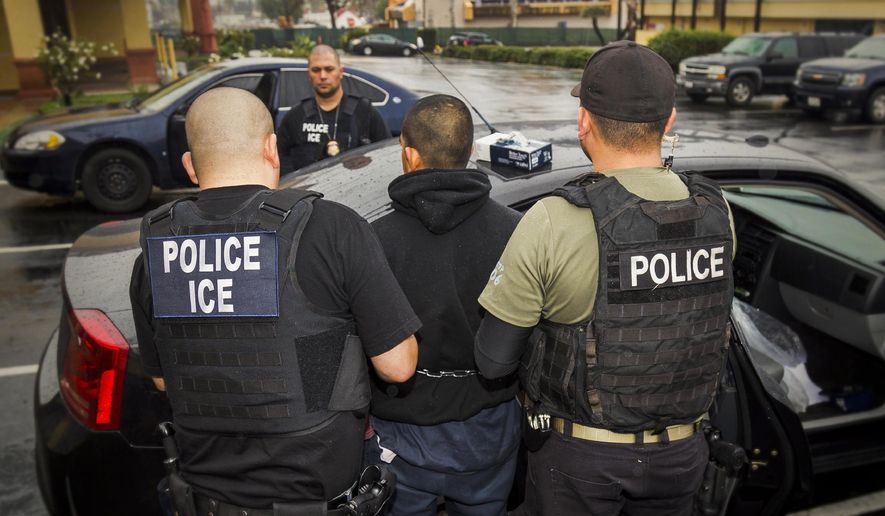Prince George’s County is rethinking its sanctuary policy limiting cooperation with the Department of Homeland Security after being dinged by repeated reports of undocumented immigrant criminals it shielded from deportation.
The county’s corrections department told The Washington Times that it is “currently examining the policy.”
Prince George’s joins a growing movement of Democrat-led jurisdictions that are questioning their sanctuary rules that limit, or in some cases prevent altogether, cooperating with deportation officers at U.S. Immigration and Customs Enforcement.
At issue are what’s known as deportation “detainers,” which are requests from ICE to be notified when a deportation target is about to be released from custody.
Prince George’s County’s current policy allows notification of ICE only in cases where the person has been convicted of serious violent felonies. Those who have been arrested but not convicted are supposed to be off-limits, as are those with misdemeanor or lesser felony convictions.
“However, as the national conversation is continuously developing and conditions are evolving, the county is currently examining the policy,” said Andrew Cephas, public information officer for the county’s corrections department.
The announcement came in response to an ICE statement this month complaining that the county had refused to cooperate with a deportation “detainer” request for an MS-13 gang member with a history of criminal behavior, including 17 arrests between 2005 and now. Eight of those occurred in Prince George’s County.
The arrests led to seven criminal convictions for charges ranging from burglary and destruction of property to illegally entering the U.S. after deportation.
ICE said Prince George’s County refused five different detainer requests. The District of Columbia also refused one request.
“This Salvadoran gang member has made a habit out of breaking American laws,” said Darius Reeves, head of ICE’s Enforcement and Removal Operations in Baltimore.
After the county’s most recent release, ICE said it met with the man on March 5. It declined to name him, citing its privacy policies.
That man is the latest in a long line of declined detainers in Prince George’s.
In 2019, the county acknowledged a migrant without documentation who had been charged with attempted murder, was sought by ICE but released, and went on to be accused of taking part in a vicious gang slaying of a 14-year-old girl he feared was going to snitch about a gang robbery. The migrant, Joel Ernesto Escobar, was also connected to MS-13.
Montgomery County, which borders Prince George’s County, has already changed its sanctuary policy and is now cooperating with ICE on cases that it would have refused earlier.
That includes a Salvadoran and a Honduran, both turned over on March 11 in compliance with ICE detainer requests.
Montgomery County officials came under severe criticism after it was revealed that an immigrant without documentation charged with killing a 2-year-old had twice been arrested and released by the county in defiance of ICE detainer requests.
The county said the man’s criminal record wasn’t serious enough to trigger cooperation with ICE at the time he was in custody.
Montgomery County Executive Marc Elrich said he would add new crimes to the list that triggers cooperation with ICE, and he also said his office would do a review in each case where a detainer would be declined, and decide if the policy should be overridden.
He also said the county would try to give a full 48-hour notice to ICE so someone could be ready to pick up a target before release.
Sanctuary jurisdictions say such policies promote better relations with immigrants, who don’t have to fear cooperating with local authorities.
Mr. Reeves, though, said ICE is not in the business of targeting victims or other rank-and-file illegal immigrants and is instead looking for the “most egregious” cases.
“The two detainees that we took custody of were both charged with sexually abusing Maryland minors,” he said after Montgomery County began cooperating.
Prince George’s policy allows cooperation in cases where someone had a conviction for abduction, arson first-degree, kidnapping, manslaughter (excepting involuntary manslaughter), mayhem, maiming, murder, rape, robbery, carjacking, or armed carjacking.
It also covers cases of sex offense first degree, sex offense second degree, use of a handgun in the commission of a felony or other crime of violence, assault in the first degree, assault with intent to murder, assault with intent to rape, assault with intent to rob, assault with intent to commit a sexual offense in the first degree, and assault with intent to commit a sexual offense in the second degree.
Prince George’s County Council Chair Jolene Ivey told The Times earlier this month that she hadn’t heard any clamor for a rethink.
“It sounds like coming up with something about undocumented citizens committing crimes is just something to start a fight,” she said. “I don’t have any outreach from the community about it right now.”
The Times has reached out to Ms. Ivey for comment for this report.
• Stephen Dinan can be reached at sdinan@washingtontimes.com.




Please read our comment policy before commenting.